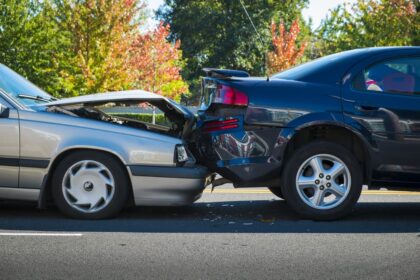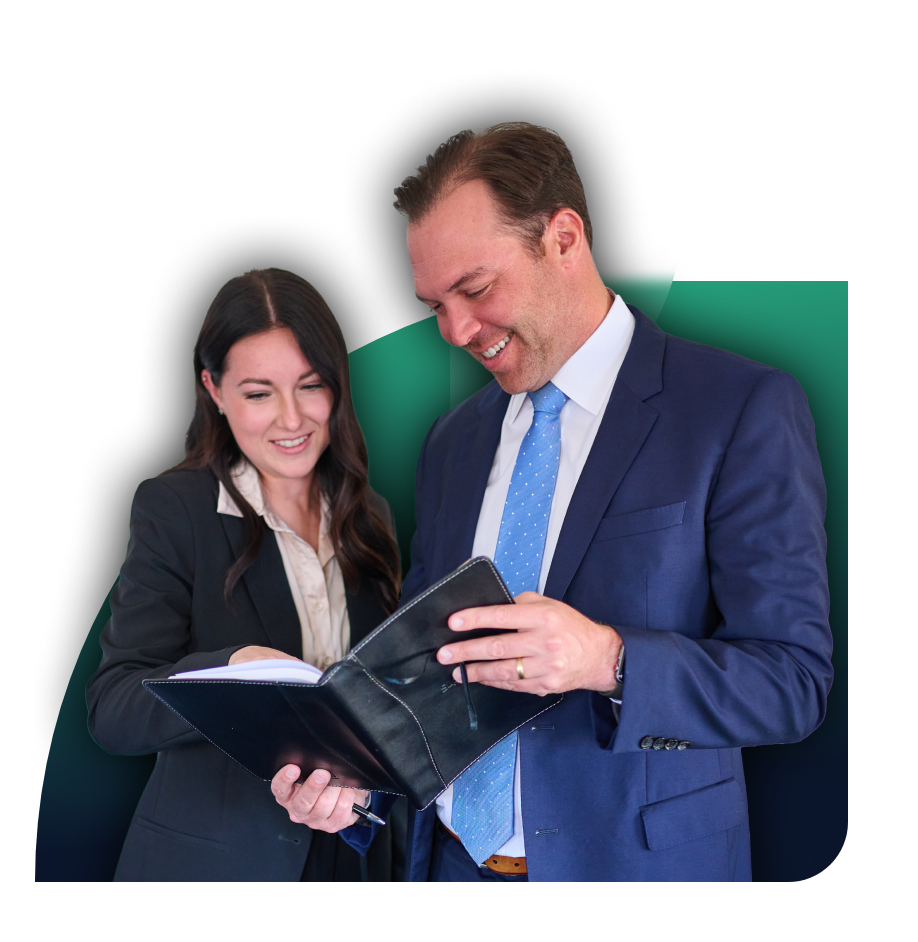Causes of rear-end accidents include tailgating, speeding, and driving while impaired. Vehicle defects can also contribute to rear-end collisions. As the victim of such an accident, you deserve fair compensation for medical bills, lost income, and other damages.
Yet, most accident victims lack the experience, time, or capability to handle their own cases. Even with legal experience, you need an objective legal representative.
You can hire a rear-end collision lawyer to fight for the compensation you deserve. They will handle every case-related detail and demand that liable parties compensate you fairly.
Common Causes of Rear-End Accidents
When a vehicle strikes another, someone acted negligently. An attorney determines the cause of the accident and, in doing so, identifies they can hold liable for a victim’s damages.
Your lawyer may find one or more causes of your rear-end accident, including:

Speeding
Speeding accounts for a large portion of fatal motor vehicle accidents and is often a factor in rear-end collisions.
When motorists speed, they:
- Have less time to respond to hazards ahead, such as braking vehicles
- May have a higher likelihood of losing control of their vehicle and striking a vehicle in front of them
- May cause a rear-end collision due to their decision to speed
Authorities set speed limits to protect motorists. When drivers exceed the speed limit, they place themselves and others in danger. For this reason, speeding motorists can be financially responsible when they cause a rear-end collision.
Tailgating
One of the most obvious hazards for rear-end collisions is tailgating. When motorists do not leave several car lengths between their vehicle and one in front, they risk striking the front vehicle if the driver brakes.
Motorists must maintain a Safe Driving Distance, or Assured Cleared Distance Ahead. If the motorist strikes another vehicle, they did not maintain a Safe Driving Distance.
Driving While Impaired
When a motorist is not alert because of impairment, they may not:
- Spot hazards ahead of them (including stopped vehicles)
- Keep a safe distance from the vehicle in front (which requires constantly monitoring road conditions and other vehicles’ movements)
- Stop in time to avoid striking the stopped vehicle
Several types of impairment can increase the risk of a rear-end collision, including:
- Intoxication by alcohol
- Drug impairment
- Being tired
- Being emotionally unstable (such as angry or depressed)
An impaired motorist cannot dedicate their complete attention to the road.
Driving an Unsafe Vehicle
A motor vehicle must be in good working condition every time the driver operates the car. Rear-end collisions can result when an unsafe vehicle malfunctions.
Specific vehicle defects that can cause accidents are:
- Tire blowouts: When a motor vehicle’s tire blows out, the driver may lose control. This may cause them to hit other cars in adjacent lanes.
- Brake failure: Brakes are the most important line of defense between one motor vehicle striking another. If a motor vehicle’s brakes give, the vehicle will continue moving forward into the vehicle in front—potentially causing a rear-end accident.
- Headlight and brake light failures: If a motorist’s headlights are not working, they may not see the vehicle in front of them during the night, in foggy conditions, or in rain. Similarly, if a motor vehicle’s brake lights are not working, a motorist may not tell when the car in front of them is slowing down or stopping. In either case, there is a heightened risk of a rear-end accident.
Other motor vehicle defects can also contribute to a rear-end accident. In these cases, the motor vehicle manufacturer, seller, or owner may be responsible for the harmful defect. Liability varies on a case-by-case basis, and a rear-end accident lawyer will establish fault for your accident.
Dangerous Road Conditions
Roads can present hazards in their own right.
A dangerous road may:
- Contains debris or other hazards
- Has potholes, cracks, or other blemishes that can cause a tire blowout
- Has uneven surfaces that may catch the edge of a wheel and affect a vehicle’s path
- Has work crews or construction zones positioned dangerously
- Lacks adequate signage, traffic lights, or other safety-specific signage
If dangerous road conditions are a factor in a rear-end accident, you may hold a municipality or other party responsible for road conditions liable for the accident.
Who Is Responsible for a Rear-End Accident?
Each case involves different facts. A lawyer must evaluate each case individually, and then they can establish liability for a client’s accident-related damages.
Potentially liable parties include:
- A motorist who is liable when their actions (or failures to act) contribute to a rear-end accident
- A motor vehicle manufacturer or seller who may be liable when a vehicle defect causes a collision
- A municipality that may be responsible when dangerous road conditions contribute to a rear-end accident
- An institution (such as a restaurant, bar, or liquor store) that overserves a drunk driver who causes a rear-end accident
The experienced eye of an attorney can quickly identify those who you can hold responsible for a rear-end accident.
What Harm (and Recoverable Damages) Can Result from a Rear-End Accident?
Motor vehicle accidents can cost millions of dollars in damages. Even if your damages do not reach the six-figure value mark, you should receive all the money you deserve.
An attorney will review all of your accident-related damages and determine the financial cost of each. Those damages may include:
Motor Vehicle Repairs
Your lawyer will seek money to repair your vehicle, including fixing the backend where another motorist hit your vehicle.
Other Property Expenses
You may also deserve compensation for:
- Temporary transportation (Uber, Lyft, other rideshare services, taxis, or rental car)
- Replacing your phone and any other electronics damaged during the accident
- Replacing any clothing and accessories damaged during the accident
Your attorney can contact a mechanic to determine the exact cost of repairing your vehicle. They will also determine the replacement value of all damaged property.
Pain and Suffering
When you are in a car accident, the effects can be psychologically and emotionally devastating.
These effects may include:
- Post-traumatic stress disorder (PTSD)
- Depression
- Anxiety (which may include a fear of being in motor vehicles)
- Sleep problems
- Lost quality of life
Your attorney will seek compensation for these kinds of damages, as well as any physical pain from your injuries. If you need counseling, medications, or any other treatment for your pain and suffering, your lawyer will consider these expenses, too.
Lost Income
If your accident-related injuries interfere with your work, your damages may include:
- Lost income
- Diminished earning power
- Missed bonuses
- Lost benefits
- Lost opportunities for promotions
- Loss of professional fulfillment
These damages can be especially costly for accident victims with disabling injuries. If necessary, your lawyer will project the cost of damages through the remainder of your working life.
Medical Bills
Your lawyer will work with your doctor to total your medical bills. If you are still dealing with injuries or receiving treatment, your attorney will calculate the cost of future treatment.
A Wrongful Death
If your loved one passed away from injuries caused in a rear-end accident, a lawyer can seek compensation for your damages, which may include:
- Funeral expenses
- Your pain and suffering
- Any suffering the decedent experienced before passing away
- Loss of the decedent’s income, benefits, and other work-related support
- Loss of the decedent’s contributions to the household (such as security, accounting services, and handiwork)
- Healthcare expenses
Attorneys do comprehensive accounts of their client’s damages. Your lawyer will identify and value every type of harm resulting from your rear-end accident.
Steps to Take After a Rear-End Collision
The aftermath of a rear-end collision can be chaotic and confusing. It may help to follow a couple of steps, including:
Seeking Medical Attention for Accident-Related Injuries
See a doctor after your rear-end collision, as receiving immediate medical care will:
- Ensure that you are aware of all accident-related injuries
- Provide documentation of your injuries, including any X-rays, MRIs, and CT scans
- Ensure that you have a treatment plan to promote recovery
- Spare you from any potentially life-threatening conditions that require medical attention
If you have not received medical care for accident-related injuries, an attorney can refer you to a trusted doctor.
Retaining an Auto Accident Lawyer
When you hire a rear-end accident lawyer, you:
- Get immediate guidance about how to proceed with an insurance claim or lawsuit
- Do not have to deal with insurers, who may attempt to deprive you of the compensation you deserve
- Can focus on your health and recovery while your lawyer oversees your claim or lawsuit
Once you choose a lawyer, you can forget about your case. Your attorney will provide regular updates and explain any steps you must take.
How Do I Choose a Rear-End Accident Lawyer
You can use several criteria to choose your attorney and may consider:
- The law firm’s experience: Consider how long a law firm has been representing clients, particularly auto accident victims. The more experience a lawyer or firm offers, the more inclined you may be to hire that lawyer or firm.
- The firm’s client reviews: You may have access to client reviews of a law firm, perhaps on Google or other review hubs. Examine those reviews and determine if former clients are generally satisfied or dissatisfied with the service they received from a law firm.
- The firm’s practice areas: A law firm should list your case type among its practice areas. When a firm has a practice area, it indicates that it dedicates resources and manpower toward serving victims of that accident type.
- Your free consultation: Personal injury law firms typically offer free consultations. These are free discussions (generally on the phone) during which you can ask a law firm any questions you have. You might gauge the law firm’s patience, attention to detail, and transparency during your free consultation.
- The firm’s case results: If you have information about a law firm’s case results, consider it carefully. If a law firm has recovered large settlements and verdicts for many car, truck, and motorcycle accident victims, this may be a “pro” in the firm’s favor.
You should also exercise your judgment and trust your instincts. If a law firm meets objective criteria (like impressive case results), and the firm feels like a good fit for your case, you may choose to hire that firm.
What Responsibilities Does a Lawyer Handle for Rear-End Accident Victims
A lawyer will manage every aspect of your lawsuit or claim, which may include:
Establishing Liability for Your Rear-End Accident
Your lawyer will determine who is responsible for your accident. This includes both who caused the collision and who is financially responsible for your damages (which can be the same party).
Securing All Relevant Evidence from the Collision
Your lawyer will gather all evidence to obtain a favorable settlement or verdict, which may include:
- Eyewitness testimony about the rear-end accident
- Video footage of your accident
- Photographs of vehicle damage (and the accident scene, if circumstances permit)
- An expert’s reconstruction of the accident (which may be digital or physical)
- A police report detailing the collision
Lawyers act quickly to gather evidence, as certain evidence (like traffic camera footage) may soon disappear.
Documenting Damages (and Calculating the Value of a Fair Settlement)
Your lawyer will seek proof of all your accident-related damages, which may include:
- Images showing your injuries
- Medical records documenting your injuries, symptoms, and care
- Invoices for vehicle repairs and other property-related expenses
- Experts’ diagnoses of physical and psychological injuries (and required treatment)
- Any other documentation illustrating your economic or non-economic damages
When your lawyer enters settlement negotiations, they will do so with as much proof of your damages as they can collect.
Negotiating a Settlement or Going to Trial, if Necessary
Your attorney will demand that liable parties pay the settlement you deserve. If your attorney exhausts negotiations without receiving a fair offer, they may encourage you to proceed to trial. If so, your lawyer will handle every step of the trial.
Contact Local Car Accident Lawyers as Soon as Possible

Do not wait to review lawyers in your area, as the law gives you a brief time to file your case. Your personal injury attorney will immediately begin fighting for the compensation you deserve.


